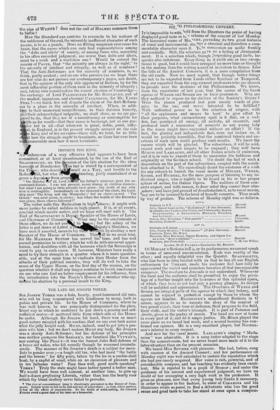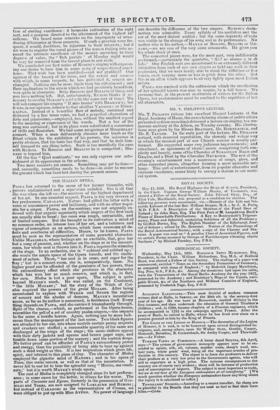SIX T H PHILHARMONIC CONCERT.
IT is impossible to witt,.
hold from the Directors the praise of having displayed good taste in tt;e scheme of the concert of last Monday. pervading it S two gmeat features The honoured name of Mo..7,ART, sta,mps a classical and therefore a cam- mendable vocal and instrumental, Ti2is concession we make frankly mendable character upon it. gaye us a feeling of disappoint- and cordially. Still, the selection ment. It is a selection which, though bespeaking good taste, be- speaks also indolence. Every thing in it (with one or two excep- tions) is good, but it could have occupied no more time or thought in the making than the writing a card of invitation to dinner. Like the bills of the Ancient Concerts, it is a mere compilation from the old cards. Now we must repeat, that though better things are not to be expected from Lords either Spiritual or Temporal, they are expected from the experienced professors who are chosen to preside over the destinies of the Philharmonic. We knosv, from the experience of last year, that the scores of the finest operas of WEBER and SPOHR, are in their possession. Why are they suffered to repose on the shelves of the Society's library ? Were the pieces produced last year merely words of pro- mise tothe ear, and never intended to be fulfilled ? With unlimited power as to the selection of singers, with " all the appliances and means to boot" to give effect to their purposes, what extraordinary spell is it that, on a sud- den, has paralyzed all energy, all activity, all research, and produced such a succession of concerts as any young lady in the room might have suggested without an effort ? If the fact, the glaring and indisputable fact, were not before us, it would be perfectly incredible, that the combined talents and ex- ertions of such men could produce such results. We know the excuse which will be pleaded. The subscribers, it will be said, expect such and such singers to be engaged ; they will have RUBIN' and LABLACHE, and all other Italian artists of eminence, and it is in vain to expect of them to encounter the boldness and originality of the German school. We doubt the fact of such a disposition on the part of the subscribers, coupled with the condi- tion attached to it. We exceedingly doubt the existence of a wish (to any extent) to banish the vocal music of Mozaar, WEBER, SPOHR, and HUMMEL, for the mere purpose of listening to any in- dividual singer, who is nightly to be heard in his or her proper sphere of action, the Italian Opera. The auditors of these con- certs expect, and with reason, to hear what they cannot hear else- ,where; and have just ground of dissatisfaction it', as to vocal music, 'hey are to be lowered to the level of benefit concerts. Thus much by way of preface. The scheme of Monday night was as follows.
Sinfonia in E 1 Mozart. Aria, Signor LAB LACII " (11 Don Giovanni) Mozart. Qui mato, two Violins, two Violas, and Violoncello, Messrs SPACNOLETTI, A. GRIESBACII, DIOIZALT, DANIELS, and LIvDLEY. M7;1S. Scena, Miss litVIERE," palate" :b71:0a. Overture, Jessoncht Spohr.
ACT II.
Sinfonia in C minor Beethoven. Aria, Signor Run ix;, "II mio tesoro" (II Don Giovanni)
Mozart.
Fantasia, Flute, Mr. zt
Terzetto, Miss Kivu:ay.; Signor and Signor LA. ni.Acnn, " Quel sembiante" .° M. n Weber.
Overture, Per Freiselditz
Leader, Mr. F. CuAmea—Conductor,Mr. Bzsuor..
Of MOZART'S Sinfonia in E b, or its performance, we cannot speak in terms of measured commendation. Each was worthy of the other ; and equally delightful was the Quintet. SPAGNOLETT/, who has been so long located with us that he has all our English enthusiasm for MOZART, made his audience feel how fully he appreciated the varied and ceaseless beauties of that incomparable composer. The overture to Jessonda is not understood. Whenever the band and the audience.shall be permitted to enjoy the privi- lege of a further insight into the.treasures of this splendid opera, of which they have as yet had only a passing glimpse, its design will be unfolded and appreciated.. The Overtures of WEBER and SPOHR are integral parts of the operas to which they .belong, and cannot be enjoyed in perfection except by those to whom the open-is are familiar. BEETHOVEN'S magnificent Sinfonia in C minor, appears to us to narrate the .story of the combat of two proud. chiefs, their tone of defia.nce, their progress to the field, their strife, and the victor's triumph. It is part of Palamon and Arcite, given in the poetry of music. The band are now at home in every part of it, and do it ample justice. Mr. BiiHM played the same piece as.we heard last week, and a sedond hearing has con- firmed our opinion. He is a very excellent player, but Nicnoe- SON'S inferior in every respect. And now for the vocal music. LABLACHE'S singing "Made.. mina" was admirable. It is a song better adapted to the stage than the concert-room, but we never heard more made of it in the lattersituation than on the present occasion. We heard MISS RIVIERE. with pleasure. She had, before, sung with success at the Ancient Concert ; and her performance on Monday night was well calculated to sustain the reputation whichi she had previously acquired. Her voice is rich, powerful, and of considerable compass, and her teaching has evidently been excel- lent. . She is reputed to be a pupil of BISHOP; and under the guidance of his correct and experienced judgment, we have no doubt of her occupying a :very high rank in the profession. It gives us pleasure, now that every young lady thinks it necessary, in order to appear in the fashion, to sneer at CIMAROSA and his illustrious rivals as passé, to find a debutante who has the good sense and good taste to take her stand at once upon a composi. tion of sterling excellence : it bespeaks cultivation of the right sort, and a purpose directed to the attainment of the highest ex" -tellence. We heard some remarks on the impropriety of intro- ducing d6butantes at these concerts. If such a practice were fre- quent, it would, doubtless, be injurious to their interests ; but if We were to register the vocal pieces of the season (taking into ac- count the intrinsic excellence of the music) according to their degrees of • value, the " Deh parlate " of Monday night would be very far removed from the lowest place in our scale.
We concluded our first notice of RuniNes singing with express- ing our desire to hear him in some song of unquestioned excel-
lence. That wish has been gratified—and not gratified! Our opinion of the beauty of his voice, and the extent and success with which, in some respects, he has cultivated it, remain un- changed. Nothing can be more facile than histifiorimenti ; and their application to the airs in which we had previously heard him, was quite in character. Strip RossiNL and BELLINI of these, and
you have nothing left. But, unfortunately, Runim thinks it ne-
cessary to overlay MOZART'S gold with the same sort of tinsel. We will not compare his singing "11 mio tesero" with BRAHAM'S ; but it was, in our opinion, inferior to that of either VAUGHAN or HORN- CASTLE. Instead of a beautiful flow of melody, sustained and delivered by a fine tenor voice, we had a perpetual alternation of
forte and pianissimo,—employed, too, without the smallest regard
to the meaning or expression of the words. Not a bar of the song was sustained ; but in its place were substituted a succession of trills and flourishes. We had some misgivings at MOSCHELES' concert. When a man deliberately chooses mere trash as the fittest vehicle for the exhibition of his powers, the inference is pretty obvious, that his taste lies that way, and that he feels him- self unequal to anything better. Such is too manifestly the case with RUBINI. To Rossim and BELLINI he is competent ; MO- ZART is beyond him.
Of the trio " Quel sembiante," we can only express our asto- nishment at its appearance in the scheme. Two more concerts yet remain. Something may yet be done— and, assuredly, something needs to be done—in order to recover the ground which has been lost during the present season.




























 Previous page
Previous page